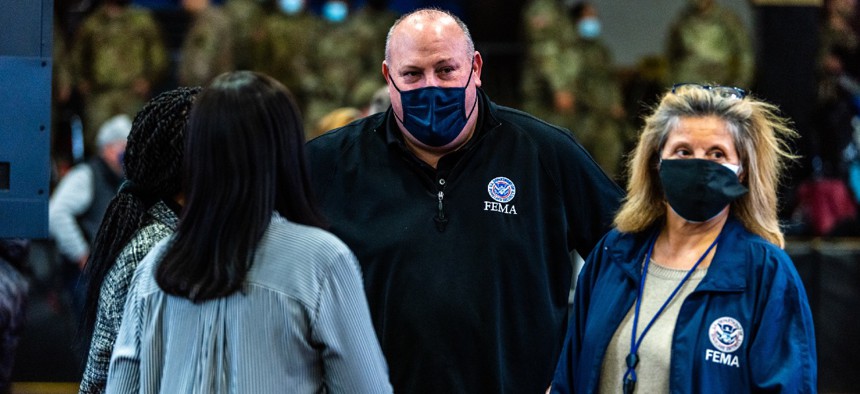
FEMA's Bob Fenton tours a COVID-19 vaccination site in New York in February. Fenton has been tapped to lead the effort to bring more than 100,000 Afghans into the United States. K.C. Wilsey/FEMA
Biden Taps FEMA Official to Lead Afghan Resettlement Efforts as Agency Deploys Thousands in Ida Response
Agencies are sending employees throughout the United States and around the world in a scramble to tackle multiple crises at once.
As the Biden administration finalized America's military mission in Afghanistan, it is looking to civilian agencies to complete the resettlement of evacuees and other responsibilities.
President Biden has tapped the Homeland Security Department to coordinate the effort to bring more than 100,000 Afghans into the United States, and DHS in turn designated Bob Fenton, a career employee at the Federal Emergency Management Agency, to coordinate the initiative. Fenton will head an interagency Unified Coordination Group that will initiate immigration procedures, conduct COVID-19 testing, oversee processing at domestic military installations and provide other resettlement support. The group will look to synchronize activities taking place within DHS components and the departments of Defense, State, Health and Human Services and others. DHS will ensure agencies are using the appropriate resources, authorities and expertise, the department said.
With the military withdrawing all of its remaining troops and equipment Monday afternoon, officials said State will take over all aspects of coordinating the evacuations of those still seeking to leave Afghanistan. Only a “small number” of American citizens remain in the country, White House Press Secretary Jen Psaki said on Monday, though reports have suggested a much larger number of U.S. government allies and other vulnerable Afghans may be left behind.
“For Americans and other vulnerable individuals who want to be able to leave Afghanistan after our withdrawal is complete, the State Department is going to continue to work across many different levels to facilitate that transportation,” John Kirby, a Pentagon spokesman, said on Monday. “We do not anticipate a military role in that effort.”
Several civilian agencies have already deployed significant resources toward the effort, sending employees volunteering for details to military bases and at least two domestic airports to help process evacuees and arrivals. A total of 300 Customs and Border Protection, Immigration and Customs Enforcement, Transportation Security Administration and U.S. Coast Guard employees have deployed to third countries—the so-called “lilypad” locations in Germany, Italy, Bahrain, Spain, Qatar, the United Arab Emirates and Kuwait—to help process and screen Afghans as they await potential entry into the United States, according to a DHS spokesman.
FEMA’s Fenton will now oversee the entire process. Currently the head of FEMA’s region nine, he has twice served as acting FEMA administrator and has been at the agency since 1996. He has responded to more than 100 disasters including Hurricane Katrina, wildfires in southern California and the September 11 terrorist attacks.
“There is no one better than Bob Fenton to help lead our efforts,” DHS Secretary Ali Mayorkas said. “Bob has dedicated his career to public service and has decades of experience managing complex and critically important missions. He will help lead this interagency effort with incredible adeptness and the highest standards of honor and integrity.”
FEMA will play a direct role in the Afghan resettlement process by providing COVID-19 vaccinations to any arrivals who want one. CBP processes the flights as they arrive and grants parole to individuals without citizenship, permanent residency or Special Immigrant Visas so they can remain in the United States as their cases go through the vetting process. DHS is working with Defense, State, the FBI and others in the intelligence community in conducting that screening. U.S. Citizenship and Immigration Services, which has also deployed volunteers in its workforce to assist in the resettlement effort, has personnel working with Afghans at military installations to review forms and adjudicate cases in collaboration with State and non-governmental organizations. DHS taking charge of the operation will ensure every agency is held accountable and making all of their resources available, a spokesman said.
FEMA, meanwhile, has its hands full leading “surge response teams” in communities hardest hit by the COVID-19 pandemic and in response to Hurricane Ida. The agency has deployed 3,600 employees to begin recovery efforts for the storm, which has knocked out power for more than 1 million people and is expected to have caused widespread destruction. FEMA is coordinating a 22-agency effort and has deployed millions of meals, hundreds of thousands of tarps and hundreds of generators. HHS has stood up an emergency medical facility, the Army Corps of Engineers has deployed response teams and the Coast Guard is leading search and rescue efforts.
FEMA earlier this year attempted to draw down its personnel deployed in COVID-19 response and at the U.S.-Mexico border, saying its staff needed to rest and prepare for hurricane season.
“I recognize that many of our staff have been activated in support of COVID-19 response operations and numerous other disaster declarations for over a year, and we will ensure that our deployed workforce gets the rest and training to be ready for what comes next,” FEMA Administrator Deanne Criswell told Congress last month.







